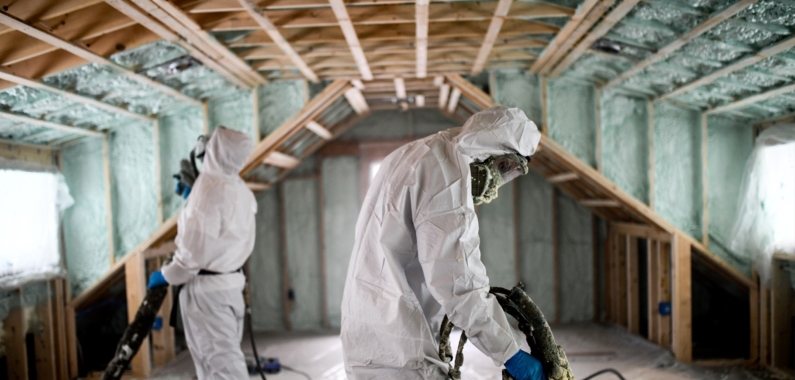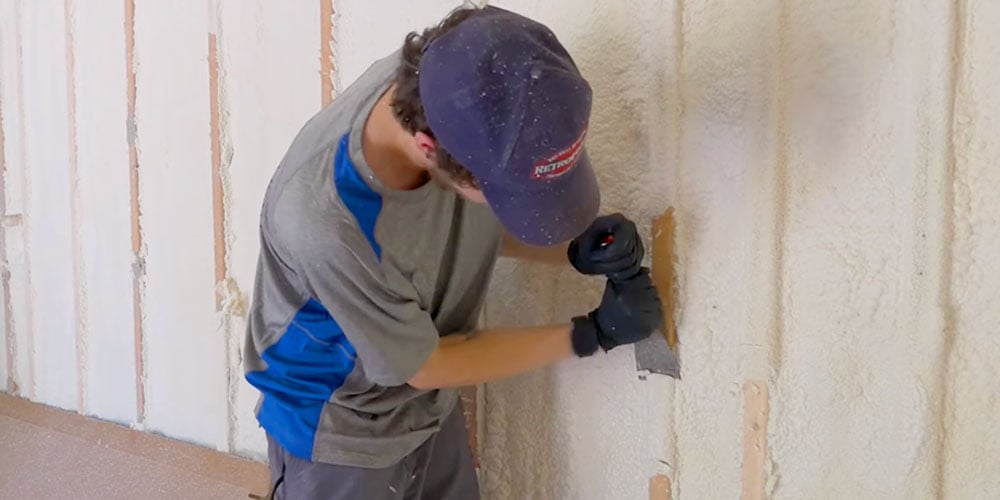Contrasting Spray Foam to Traditional Insulation: Which Is Better?
Contrasting Spray Foam to Traditional Insulation: Which Is Better?
Blog Article
Spray Foam: The Ultimate Option for Air Sealing and Insulation
Spray foam insulation has actually emerged as a leading service for reliable air securing and thermal insulation, offering a distinct mix of residential or commercial properties that establish it in addition to traditional methods. Its capability to broaden and load voids makes it particularly effective in stopping air leak, which can dramatically influence power efficiency. Recognizing the complete extent of its advantages, installment procedures, and contrasts with various other insulation types is important for making notified decisions. As we check out these aspects, the implications for both new constructions and retrofits become significantly substantial. What variables should affect your option?
What Is Spray Foam?
Spray foam is a flexible insulation material that integrates the concepts of air securing and thermal resistance to enhance power effectiveness in buildings. Made up mostly of polyurethane or other comparable compounds, spray foam is used as a fluid that expands upon call with surfaces, developing a solid, continuous layer of insulation. This one-of-a-kind building enables it to fill voids, cracks, and gaps that standard insulation materials might overlook, giving an exceptional air seal.
There are 2 primary types of spray foam: open-cell and closed-cell. Open-cell spray foam is lighter and a lot more flexible, supplying outstanding audio absorption and a lower R-value per inch - Spray Foam. In comparison, closed-cell spray foam is denser, providing a greater R-value, moisture resistance, and added architectural integrity to constructing elements
The application procedure usually entails specialized tools, guaranteeing a smooth application that follows different substratums, including metal, concrete, and wood. This flexibility makes spray foam suitable for both new buildings and retrofitting existing frameworks. Its ability to produce a closed obstacle substantially adds to minimizing power usage and improving interior air top quality, thus making it a favored option amongst contractors and house owners alike.
Benefits of Spray Foam Insulation
One of the most considerable advantages of spray foam insulation is its phenomenal capacity to develop a continuous air barrier, which effectively minimizes energy loss. Unlike conventional insulation materials, spray foam expands to fill gaps and cracks, ensuring that air leak is significantly decreased. This characteristic not only enhances power performance however likewise causes reduce energy costs with time.
In addition, spray foam insulation supplies exceptional thermal resistance, contributing to a more secure interior atmosphere. Its high R-value per inch allows for effective insulation in constrained areas, making it suitable for attics, walls, and crawl rooms. In addition, the moisture-resistant residential or commercial properties of spray foam help protect against mold and mildew and mildew development, promoting healthier living problems.
One more critical advantage of spray foam insulation is its sound-dampening qualities (Spray Foam). It properly minimizes noise transmission in between rooms, developing a quieter and much more comfy home atmosphere. The durability of spray foam additionally stands apart, as it does not droop or work out with time, preserving its efficiency throughout its life expectancy
Just How Spray Foam Works
Recognizing exactly how spray foam insulation functions is important for valuing its effectiveness in air securing and thermal resistance. Spray foam insulation includes two key components: isocyanate and polyol resin. When these parts are blended, they undertake a chemical reaction that triggers the product to expand quickly, creating a dense foam that fills up splits, gaps, and tooth cavities.
As the foam increases, it follows surface areas, forming a closed seal that substantially lowers air infiltration. This characteristic makes spray foam insulation extremely efficient at protecting against drafts and moisture penetration, which can result in energy loss and damage gradually. In addition, the closed-cell version of spray foam supplies superior thermal resistance due to its rigid structure, efficiently lessening warm transfer.
The special buildings of spray foam permit it to conform to irregular surface areas, making certain comprehensive insurance coverage and a seamless obstacle. Therefore, spray foam insulation not only improves energy efficiency but additionally adds to boosted interior air high quality by decreasing the accumulation of toxins and irritants. Eventually, understanding the mechanics behind spray foam emphasizes its duty as a remarkable option for insulation and air sealing in both industrial and domestic applications.
Installment Refine Summary

Before installment, the room should be appropriately cleaned and prepped, making sure that surface areas are without dust, particles, and dampness. visit the website Since impurities can endanger attachment and total efficiency, this action is crucial. Once the area is prepared, the application includes mixing the two elements of the spray foam, which broadens upon get in touch with and fills up spaces successfully.
Educated specialists need to perform the installment, making use of customized tools to make certain consistent insurance coverage and ideal density. Security safety measures, including wearing protective equipment and making certain correct get more air flow, are critical throughout this process. After application, the foam usually remedies rapidly, forming a strong obstacle that improves energy performance.
Contrasting Spray Foam to Standard Insulation
When examining insulation alternatives, spray foam insulation sticks out in contrast to typical products such as fiberglass and cellulose. One of the key advantages of spray foam is its superior air securing abilities. Unlike fiberglass and cellulose, which can allow air seepage, spray foam broadens upon application, filling gaps and holes to develop an airtight seal. This causes improved energy performance, as less warmed or cooled down air escapes the home, bring about lower energy expenses.
Additionally, spray foam supplies a greater R-value per inch than conventional insulation kinds, providing even more effective thermal resistance in a thinner account. This characteristic is specifically useful precede with restricted dental caries depth. Spray foam is immune to dampness and mold development, which can be a significant issue with cellulose and fiberglass, especially in moist environments.
Nevertheless, spray foam insulation commonly carries a greater ahead of time cost than its conventional equivalents. Home owners must evaluate this preliminary financial investment versus long-term power savings and efficiency benefits. Ultimately, while both insulation types offer their objective, spray foam becomes an extra sophisticated solution for contemporary insulation requirements, specifically in regards to air securing and thermal performance.

Verdict
In recap, spray foam insulation stands for a very efficient option for accomplishing ideal air sealing and thermal resistance. Its distinct homes, including moisture resistance and sound dampening, make it ideal for numerous applications in both brand-new buildings and visit this site right here retrofitting projects (Spray Foam). Although the initial prices might be greater compared to traditional insulation products, the lasting benefits, such as significant power financial savings and enhanced indoor air top quality, warrant the investment and underscore its worth in contemporary building techniques.
Spray foam insulation has actually emerged as a leading option for effective air securing and thermal insulation, providing an unique mix of homes that establish it apart from conventional approaches.Spray foam is a flexible insulation product that combines the concepts of air sealing and thermal resistance to improve power effectiveness in structures.When assessing insulation alternatives, spray foam insulation stands out in comparison to standard materials such as fiberglass and cellulose. Eventually, while both insulation kinds serve their function, spray foam arises as a more sophisticated solution for contemporary insulation demands, particularly in terms of air sealing and thermal performance.
In summary, spray foam insulation stands for a very effective option for achieving optimal air securing and thermal resistance.
Report this page